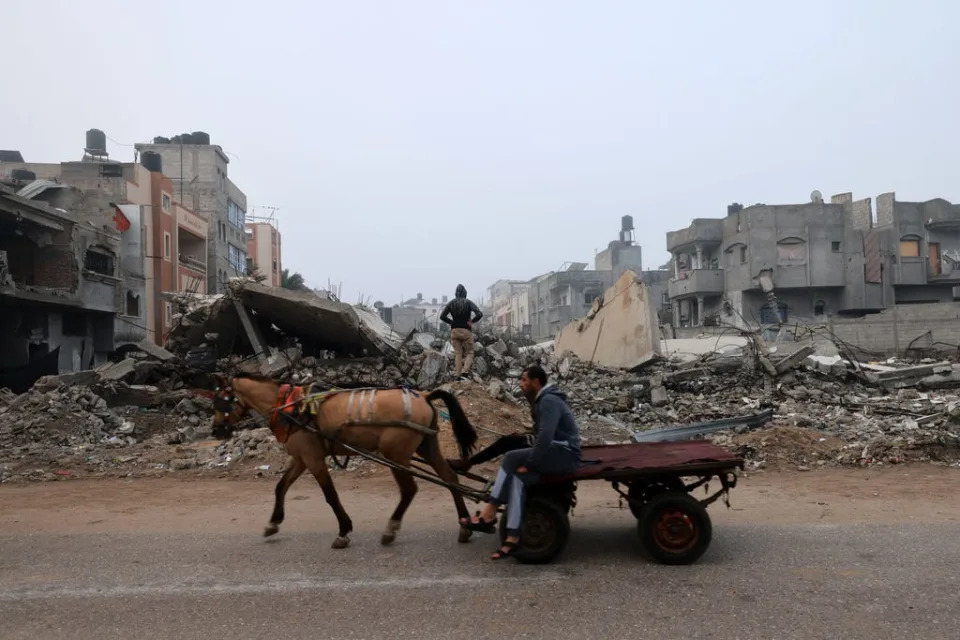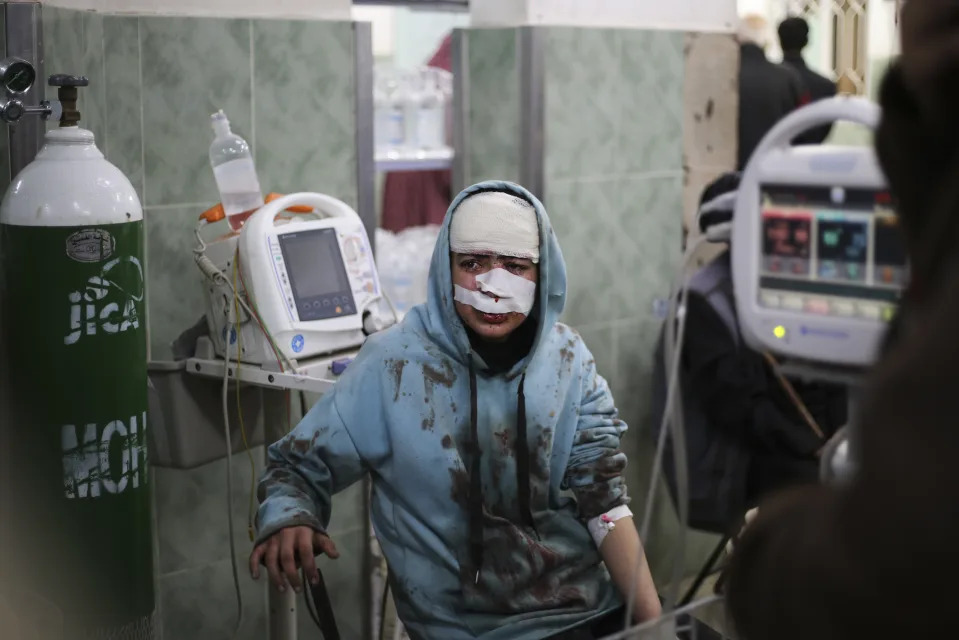Israel’s neighbors and key mediators warned Saturday of disaster and repercussions if its military launches a ground invasion in Gaza’s southern city of Rafah, where Israel says remaining Hamas strongholds are located — along with over half the besieged territory’s population.
Israeli airstrikes killed at least 44 Palestinians — including more than a dozen children — in Rafah, hours after Prime Minister Benjamin Netanyahu said he asked the military to plan for the evacuation of hundreds of thousands of people ahead of an invasion. He gave no details or timeline.
The announcement set off panic. More than half of Gaza's 2.3 million people are packed into Rafah, which borders Egypt. Many fled there after following Israeli evacuation orders that now cover two-thirds of the territory following the Oct. 7 Hamas attack that sparked the war. It's not clear where they could go next.
Egyptian Foreign Minister Sameh Shoukry said any Israeli ground offensive on Rafah would have “disastrous consequences,” and asserted that Israel aims to eventually force the Palestinians out of their land. Egypt has warned that any movement of Palestinians into Egypt would threaten the four-decade-old peace treaty between Israel and Egypt.
Another mediator, Qatar, also warned of disaster, and Saudi Arabia warned of “very serious repercussions.” There's even increasing friction between Netanyahu and the United States, whose officials have said a Rafah invasion with no plan for civilians there would lead to disaster.
“The people in Gaza cannot disappear into thin air," German Foreign Minister Annalena Baerbock said on X, adding that an Israeli offensive on Rafah would be a “humanitarian catastrophe in the making."
Israel has carried out almost daily airstrikes in Rafah, a rare entry point for Gaza's badly needed food and medical supplies, during its current ground combat in Khan Younis just to the north.
Overnight into Saturday, three airstrikes on homes in the Rafah area killed 28 people, according to a health official and Associated Press journalists who saw bodies arriving at hospitals. Each strike killed multiple members of a family, including a total of 10 children, the youngest 3 months old.
Fadel al-Ghannam said one strike tore his loved ones to shreds. He lost his son, daughter-in-law and four grandchildren. He fears even worse with a ground invasion of Rafah, and said the world's silence has enabled Israel to proceed.
Later on Saturday, an Israeli airstrike on a home in Rafah killed at least 11 people, including three children, according to Ahmed al-Soufi, head of Rafah municipality.
“This is what Netanyahu targets — the civilians,” said a neighbor, Samir Abu Loulya. Two other strikes in Rafah killed two policemen and three senior officers in the civil police, according to city officials.
In Khan Younis, Israeli forces opened fire at Nasser Hospital, the area’s largest, killing at least two people and wounding five, according to the medical charity Doctors Without Borders. Israeli tanks reached the hospital gates Saturday morning, Ahmed Maghrabi, a physician there, said in a Facebook post.
Health Ministry spokesman Ashraf al-Qidra said hospital staff are no longer able to move between buildings because of the intense fire. He said 450 patients and 10,000 displaced people are sheltering there.
The Israeli military said troops were not operating inside the hospital but called the surrounding area “an active combat zone.”
Israel’s army chief, Lt. Gen. Herzl Halevi, said more than 2,000 Hamas fighters in Khan Younis had been killed in airstrikes and ground combat, but the offensive in the city was far from over.
GAZA DEATH TOLL TOPS 28,000
Israel declared war after several thousand Hamas militants burst across the border into southern Israel on Oct. 7, killing 1,300 people and taking 250 others hostage. Not all are still alive.
The Gaza Health Ministry said the bodies of 117 people killed in Israeli airstrikes were brought to hospitals over the past 24 hours, raising the overall death toll from the offensive to 28,064, mostly women and children. The ministry said more than 67,000 people have been wounded.
Israel holds Hamas responsible for civilian deaths because it fights from within civilian areas, but U.S. officials have called for more surgical strikes. President Joe Biden has said Israel's response is “over the top.”
Netanyahu's office says it is impossible to eliminate Hamas while leaving four Hamas battalions in Rafah.
The United Nations says the city that's normally home to less than 300,000 people now hosts 1.4 million others who fled fighting elsewhere and is “severely overcrowded.” Roughly 80% of Gaza’s people have been displaced.
ELSEWHERE IN GAZA
On Saturday, Israel's military said it had discovered tunnels underneath the main headquarters of the U.N. agency for Palestinian refugees in Gaza City, alleging that Hamas militants used the space.
An Israeli airstrike on the central town of Deir al-Balah killed five people and wounded about 10 others, according to hospital officials and AP journalists.
In the Tel al-Hawa neighborhood of Gaza City, two medics from the Palestinian Red Crescent were found dead in a destroyed ambulance after going missing 12 days ago. They had tried to rescue 5-year-old Hind Rajab, who had been traveling with family to heed evacuation orders.
The PRC previously released a recording of a call from Hind’s cousin saying the car had come under fire and only she and Hind survived. The cousin went silent mid-call. Hind later died.
The PRC said the rescue mission was coordinated with Israel’s military, which had no comment.
US says it will not back unplanned Rafah offensive
The US has warned Israel that staging a military offensive into Gaza's southern city of Rafah without proper planning would be a "disaster".
Some 1.5 million Palestinians are surviving in the city bordering Egypt in dire humanitarian conditions.
The White House said it would not support major operations without due consideration for the refugees there.
The comments come days after Israel's leader said the military had been told to prepare to operate in Rafah.
Speaking on Thursday evening, and without referring to Rafah, US President Joe Biden said Israel's actions in Gaza had been "over the top".
Reported Israeli air strikes on Gaza on Friday killed at least 15 people including eight in Rafah, officials from the Hamas-run health ministry said. Israel did not immediately comment.
Salem El-Rayyes, a freelance journalist living at a camp for displaced people in Rafah, said children were among those killed when an air strike hit a house nearby. Bodies of the victims "flew from the third floor", he told Reuters.
Most of the people in Rafah have been displaced by fighting from other parts of Gaza and are living in tents.
Garda al-Kourd, a mother-of-two who said she had been displaced six times during the war, said she was expecting an Israeli assault but hoped there would be a ceasefire agreement before it happened.
"If they come to Rafah, it will be the end for us, like we are waiting for death. We have no other place to go," she told the BBC from a relative's house in Rafah where she was living with 20 other people.
The head of the Norwegian Refugee Council, Jan Egeland, told the BBC that such an operation in Rafah - which he called "the world's biggest displacement camp" - would be a catastrophe.
"There are people on their flimsy plastic sheeting. They are fighting for food. There is no drinking water. There is epidemic disease and then they [the IDF] want to bring a war to this place. You can't make it up really," he said.
Much of northern and central Gaza has been reduced to ruins by sustained Israeli bombardment since the war began on 7 October.
Earlier, US National Security Council spokesman John Kirby said the Israeli military had a "special obligation as they conduct operations there or anywhere else to make sure that they're factoring in protection for innocent civilian life".
"Military operations right now would be a disaster for those people and it's not something that we would support," he said, adding that the US had not seen anything to suggest Israel was going to launch a major operation in Rafah imminently.
Deputy State Department spokesperson Vedant Patel echoed Mr Kirby's comments, saying: ''We [the US] would not support the undertaking of something like this without serious and credible planning."
Asked by the BBC where refugees in Rafah should go in the event of an operation, Mr Patel said these were "legitimate questions that we believe the Israelis should answer".
Speaking in the Israeli city of Tel Aviv, Secretary of State Antony Blinken said any "military operation that Israel undertakes needs to put civilians first and foremost... and that's especially true in the case of Rafah".
It is rare for the US, a key ally and military backer of Israel, to talk about any forthcoming stages of the country's military offensive in Gaza - but this was a clear warning.
Washington sends around $3.8bn (£3bn) in military aid to Israel each year, making the country the world's biggest recipient of such funding.
Around 1,300 people were killed during the Hamas attacks on southern Israel on 7 October, according to Israeli officials.
More than 27,800 Palestinians have been killed and at least 67,000 injured by the war launched by Israel in response, according to the Hamas-run health ministry.
"They are living in overcrowded makeshift shelters, in unsanitary conditions, without running water, electricity and adequate food supplies," was the stark assessment of the situation by UN chief António Guterres on Thursday.
"We were clear in condemning the horrific acts of Hamas. We are also clear in condemning the violations of international humanitarian law in Gaza."
On Tuesday, Israeli Prime Minister Benjamin Netanyahu said he had ordered troops to "prepare to operate" in Rafah and that "total victory" by Israel over Hamas was just months away.

Israel prepares to evacuate Rafah before expected invasion despite US objections.
Israeli Prime Minister Benjamin Netanyahu on Friday said he asked security officials to draft plans to evacuate Rafah before expanding military operations there despite the Biden administration and humanitarian aid groups warning that an invasion of the crowded city would be devastating.
Netanyahu's office said the "combined plan" would include mass evacuations and operations to topple four Hamas battalions. The United Nations says 1.4 million people have packed into Rafah, Gaza's southernmost city, which was home to roughly 280,000 people before the war.
"It is impossible to achieve the goal of the war of eliminating Hamas by leaving four Hamas battalions in Rafah," Netanyahu's office said in a statement. "On the contrary, it is clear that intense activity in Rafah requires that civilians evacuate the areas of combat."
This week, Netanyahu rejected a Hamas proposal for a multi-stage truce and hostage release that included a demand that Israel release hundreds of Palestinian prisoners. Netanyahu vowed that Israel will continue fighting for months until it achieves “absolute victory."
More than half of Gaza's 2.3 million people have taken refuge in Rafah to escape the war, but they have not been spared from bombardment. For weeks, Israeli airstrikes have hit areas of Rafah and other parts of southern Gaza, where leaflets and evacuation orders from the Israeli Defense Forces told them to go. The Israeli military says it strikes Hamas targets and it blames the group for civilian casualties.
Those displaced in Rafah are living in makeshift structures, tents or out in the open. The U.N. and other humanitarian organizations have repeatedly warned of dire conditions, rampant spread of diseases, and a shortage of clean water, food and sewage infrastructure.

Developments:
∎ As of Friday, at least 85 journalists and media workers have been killed in the war, according to preliminary investigations by the Committee to Protect Journalists. The nonprofit said the war has been the deadliest period for journalists since it started collecting data in 1992.
∎ Since the start of the war, 27,840 people, mostly women and children, have been killed in Gaza, according to the Health Ministry.
∎ The Israeli military said on Friday that within the last 24 hours, troops have "conducted a joint naval, air, and ground troop operation to eliminate terrorist infrastructure and several terrorists." The military did not identify where all the operations occurred but said that 15 militants were killed near Khan Younis.
∎ The U.S. military on Thursday launched several strikes against four Houthi drones and seven mobile anti-ship cruise missiles that were prepared to launch against ships in the Red Sea, according to U.S. Central Command. It's the latest American attack on Houthis' military assets in recent weeks to stop the rebels from striking commercial shipping and Navy vessels.
Biden calls Israel's military response 'over the top'
The White House on Friday sought to downplay sharp criticism levied against Israel's military operation by President Joe Biden and a senior national security official.
Biden said Israel's military response in Gaza "has been over the top" – his sharpest criticism of Israel's conduct in the war. Hours earlier, U.S. National Security spokesperson John Kirby said that considering the current conditions in the region, the U.S. "would not support" intensive military operations in Rafah.
"I think you all know more than a million Palestinians are sheltering in and around Rafah. That’s where they were told to go. There’s a lot of displaced people there," Kirby said. "I could tell you that – absent any full consideration of protecting civilians at that scale in Gaza – military operations right now would be a disaster for those people, and it’s not something that we would support."
Also on Friday, the New York Times reported it had obtained a recording in which Jon Finer, the president’s deputy principal national security adviser, expressed a lack of confidence in Netanyahu’s right-wing government during a meeting with Arab American and Muslim community leaders this week. The White House National Security Council confirmed that Finer’s comments, as reported by the Times, were accurate.
An administration official told the Associated Press that Finer was speaking specifically about the Netanyahu government’s commitment to pursuing a two-state solution – one in which Israel would co-exist with an independent Palestinian state – once the war ends. Netanyahu throughout his political career has consistently opposed the creation of a Palestinian state.
“The President and Mr. Finer were reflecting on concerns we have had for some time and will continue to have as the Israeli operation proceeds, about the loss of Palestinian lives in this conflict and the need to reduce civilian harm,” National Security Council spokesperson Adrienne Watson said in a statement. “The President has made clear since the first days of this conflict that we share the aim of defeating Hamas, but that Israel must reduce, as much as possible, the impact of its operation on innocent civilians.”
Assessment of Rafah shelters describes dire conditions
Since civilians began to stream into Rafah by the thousands, humanitarian organizations, including multiple U.N. agencies, have warned of abysmal conditions facing those sheltering in the border city.
The Norwegian Refugee Council on Thursday released an assessment of nine shelters in Rafah showing that people had no drinking water, showers or personal hygiene items.
The report said shelters operated at 150% capacity and that diseases, including hepatitis A, diarrhea, smallpox and lice, "were reported in every location."
Angelita Caredda, the Norwegian Refugee Council’s Middle East and North Africa regional director, warned the situation in Rafah is "already dire, and a full-scale Israeli military operation will lead to even more loss of civilian life."
“An expansion of hostilities could turn Rafah into a zone of bloodshed and destruction that people won’t be able to escape," Caredda said. "There is nowhere left for people to flee to."
Israeli troops storm hospital in Khan Younis, Palestinian aid group says
The Palestinian Red Crescent Society, an independent humanitarian aid group, said Friday on X that Israeli troops raided Al-Amal Hospital in Khan Younis and that it had lost contact with its teams at the facility.
Thousands of displaced people and patients were evacuated from the hospital and the group's headquarters in the southern Gaza city earlier this week. Israel has focused its ground operations in Khan Younis but in recent days officials have announced an imminent shift to Rafah.
Hospitals have had to manage an overwhelming number of patients amid a shortage of health care supplies and medicines as aid continues to only trickle into the enclave. Many hospitals have had to close, sending patients and civilians to find treatment and shelter elsewhere. Israel, which has raided several hospitals, says Hamas uses medical facilities to shield military assets.
Deadly airstrikes hit Rafah as Israeli military prepares for operations
This week airstrikes bombarded Rafah as top Israeli officials said the southern Gaza city is where the military will shift its focus.
Overnight on Friday, two residential buildings were struck, killing at least eight people, according to the Associated Press, whose reporters saw bodies being taken to nearby hospitals. The night before, at least 13 people were killed in an airstrike, the AP reported, citing Kuwaiti Hospital, which received the bodies.

Israel's credit rating downgraded due to war
Moody’s Investors Service downgraded Israel’s credit rating from A1 to A2 on Friday, and changed its outlook to negative. The company cited the ongoing war as the main reason for the downgrade.
“While fighting in Gaza may diminish in intensity or pause, there is currently no agreement to end the hostilities durably and no agreement on a longer-term plan that would fully restore and eventually strengthen security for Israel,” Moody's said in a statement. “The weakened security environment implies higher social risk and indicates weaker executive and legislative institutions than Moody's previously assessed.”
The war is forecast to cost Israel nearly $70 billion from 2023 to 2025, Moody’s said, citing the Bank of Israel.
UNRWA says aid requests for northern Gaza have been denied for weeks
An official of the UNRWA, the U.N. agency for Palestinian refugees, said on X Friday the last time the agency was allowed to deliver food to northern Gaza was on Jan. 23.
Philippe Lazzarini, the commission general of the UNRWA, also said half of aid mission requests to the north have been denied since Jan. 1.
"The UN has identified deep pockets of starvation and hunger in northern Gaza where people are believed to be on the verge of famine," he said. "At least 300,000 people living in the area depend on our assistance for their survival. Preventing access prevents lifesaving humanitarian aid. With the necessary political will, this can be easily reversed."
The U.S. and other allies pulled funding from the U.N. group after Israel alleged that 12 of the agency's employees were involved in the Oct. 7 Hamas attack. Two U.N. investigations have been launched but agency officials say, without renewed funding, the UNRWA may cease operations by the end of February.
The UNRWA, with over 30,000 employees, is the largest humanitarian aid organization operating in Gaza. Over 1.7 million people in Gaza were taking shelter at UNRWA facilities as of mid-January, the U.N. reported.



